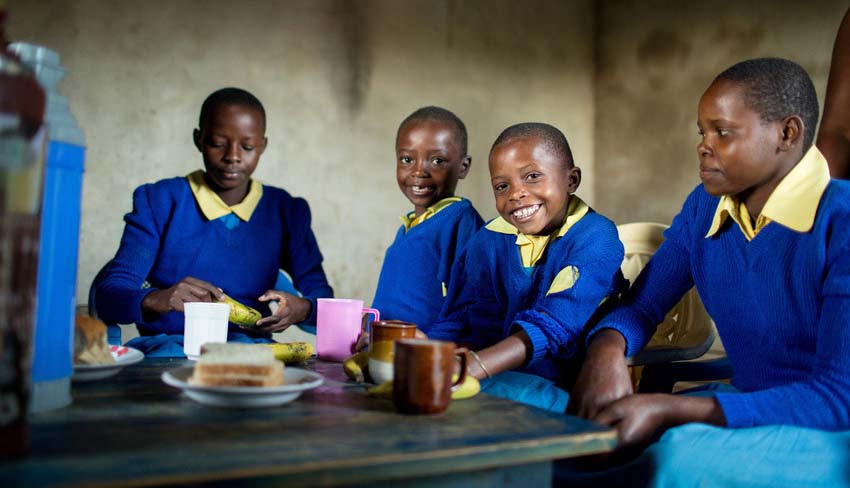Feature photo: Children of Floria and Charles Gibore, a Nuru Kenya household, enjoy a meal after returning home from school.
As the 2015 UN Summit kicks off today, Nuru International—along with the rest of the international development community—is anticipating the ratification of the Sustainable Development Goals (SDGs). The SDGs align well with Nuru’s mission is to end extreme poverty in remote, rural areas. Many of the 1.6 billion people living in extreme poverty globally lack access to education, health care, skills development and economic opportunity. These constraints limit opportunities for even the hardest workers and most inventive entrepreneurs. Collaboration within the international development community is essential to overcoming a challenge as persistent and complex as extreme poverty. Nuru sees the ratification of the SDGs as an effective way to unite the sector toward a common goal ending extreme poverty by 2030.
Nuru has uniquely offered integrated, holistic programs to farmer households since it began in 2008. This means Nuru not only addresses a household’s most basic needs, but also actively engages every household member in building resilience and breaking intergenerational poverty. Through delivering integrated programs, training local leaders and generating profits through Nuru Social Enterprises, Nuru is already delivering on 13 of the 17 goals. When applicable for its project sites, Nuru aims to address the remaining goals through strategic partnerships.
Here’s an overview of exactly how Nuru International is aligned with the SDGs to end extreme poverty in remote, rural areas:
| GOAL | Sustainable Development Goals (SDGs) | Nuru International |
|
1 |
End poverty in all its forms everywhere | Nuru targets extreme poverty in remote, rural areas through an integrated development model. 85% of people of the 1.6 billion in extreme poverty live in remote rural areas. |
|
2 |
End hunger, achieve food security and improved nutrition and promote sustainable agriculture | The first need that Nuru addresses is hunger through sustainable agriculture. Working with farmers to address food security is Nuru’s “foothold” or starting point for engaging all household members in its holistic programs. |
|
3 |
Ensure healthy lives and promote well-being for all at all ages | Nuru focuses on preventing disease and death at the household level by specifically improving maternal and child health, which can be shocks to the family. |
|
4 |
Ensure inclusive and equitable quality education and promote lifelong learning opportunities for all | Access to quality education with a focus on literacy is the key to unlock lifelong learning. Not “learning to read” but “reading to learn.” Education is the critical to ending intergenerational poverty. |
|
5 |
Achieve gender equality and empower all women and girls | Equality starts at the household level: sending girls to school and giving women opportunities for financial inclusion to be involved in the economy. These are foundational building blocks for rural societies. Nuru intentionally hires women as leaders in its community development organizations and also promotes for girls to go to school, thereby promoting more women leaders in society in the long term. |
|
6 |
Ensure availability and sustainable management of water and sanitation for all | In rain-fed agriculture where there is sustainable rainfall, there is a higher incidence of natural water sources. As a result, Nuru focuses on point-of-use (consumption) strategies for clean water and promotes positive behavior change regarding household sanitation. |
|
7 |
Ensure access to affordable, reliable, sustainable and modern energy for all | n/a |
|
8 |
Promote sustained, inclusive and sustainable economic growth, full and productive employment and decent work for all | Nuru promotes economic growth at the household level by transitioning farmers from subsistence farming to farming as a business, using crop diversification for sustainability. |
|
9 |
Build resilient infrastructure, promote inclusive and sustainable industrialization and foster innovation | n/a |
|
10 |
Reduce inequality within and among countries | Nuru seeks to help create functioning states with local populations empowered with meaningful choices, targeting some of the most marginalized populations on a spectrum of fragile states globally. |
|
11 |
Make cities and human settlements inclusive, safe, resilient and sustainable | n/a |
|
12 |
Ensure sustainable consumption and production patterns | Nuru enhances agricultural production and market linkages to enable households to cope with economic shocks and smooth out consumption. |
|
13 |
Take urgent action to combat climate change and its impacts | Nuru works with extremely poor smallholder farmers that depend on rain-fed agriculture, who are are among the most vulnerable populations to climate change. Nuru mitigates their risk through crop diversification and crop insurance. |
|
14 |
Conserve and sustainably use the oceans, seas and marine resources for sustainable development | n/a |
|
15 |
Protect, restore and promote sustainable use of terrestrial ecosystems, sustainably manage forests, combat desertification, and halt and reverse land degradation and halt biodiversity loss | Nuru promotes sustainable intensification agriculture, which helps farmers produce more crops on less land, as well as environmentally-friendly practices such as erosion control, tree planting and farming on appropriate plots. |
|
16 |
Promote peaceful and inclusive societies for sustainable development, provide access to justice for all and build effective, accountable and inclusive institutions at all levels | Nuru helps transform communities by transitioning fragmented groups of farmers who are focused on surviving today to connected groups of citizens focused communal prosperity and the future. |
|
17 |
Strengthen the means of implementation and revitalize the global partnership for sustainable development | Nuru collaborates with the international development community by strategically partnering with organizations and governments and by sharing best practices and lessons learned from its successes and failures. |


